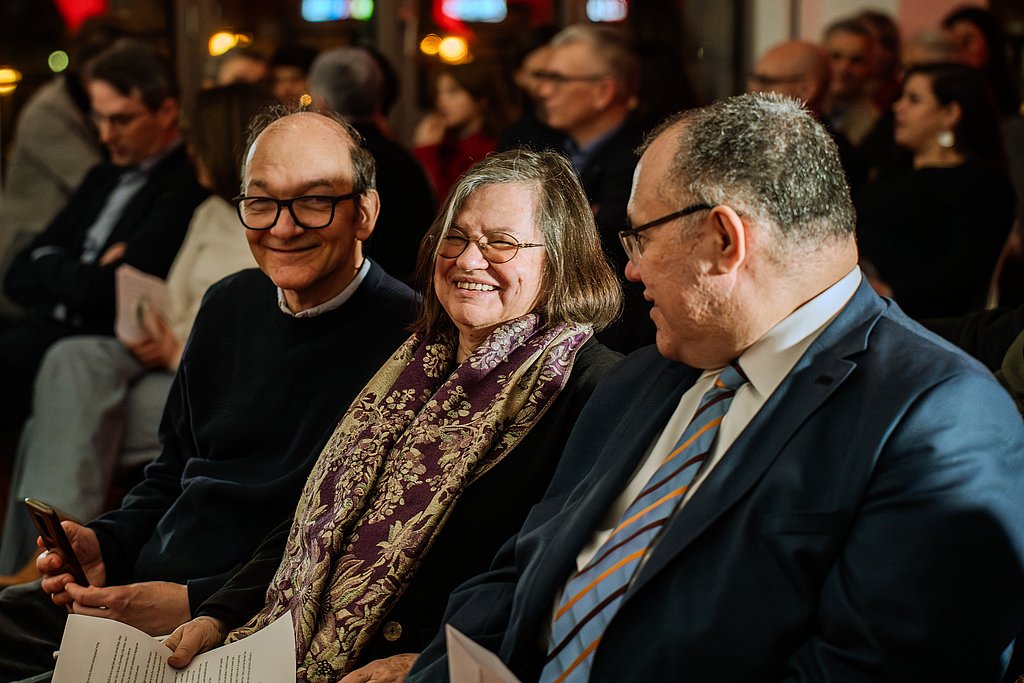“I wish we could meet. I think we could talk. I would be very interested in how she would see the way out of the current situation.”
Congratulations on receiving the Alice Salomon Award, Anna Csongor. How do you feel about it?
Thank you. It’s truly an honor to receive this award. When I found out, I was unsure how I could relate to Alice Salomon’s work, considering she was such an exceptional and ambitious woman. She created opportunities for women who lived without professional career opportunities until then, created a new profession, created a school – also in the physical sense of the word – and organized and maintained a national and international network. The profession of social work owes a lot to her. For my part, I always saw myself as an ordinary soldier, just fortunate to be part of interesting and important projects.
In your acceptance speech, you mentioned that her autobiography helped you bridge that gap. One key aspect you touched upon was the shared passion for teaching.
Alice Salomon’s autobiography was a crucial source for me. It allowed me to delve into her life and understand her unique perspective. At the very beginning of her career, it was clear to her that teaching goes both ways; it is a bilateral process. The same with me: Why did I like to teach? Why did I like to teach future social workers, social politicians, and community developers at the university? Their reflections and my conversations with them also gave me a lot, kept my knowledge awake, and helped me to make sure that my experiences and reflections are still valid, they are not outdated.
You described your work as a social worker in a district with Roma families. How do you see the parallels between your community social work and Alice Salomon’s initiatives?
In the first stage of my career, I worked as a social worker in a district of Budapest where a lot of Roma families lived. Before that, I surveyed the school situation of the Roma children there, which revealed that they have a great need for support in various areas of life. Thus, the first social worker job was created. We joined forces with a person working in the local cultural community center and did community social work long before this profession existed. Again this is something that comes up in Alice Salomon’s writing: to organize social opportunities for those in need, to provide a platform for their meetings. Later, working in the Autonómia Foundation, we focused on addressing communities. Twenty years later, this practice led to the establishment of a master’s program in community and civil studies at the university.
Another interesting point was the discussion about positive discrimination and affirmative action. How do you see this debate echoed in both your work and in Alice Salomon's time?
The debate around positive discrimination is still relevant. Alice Salomon and her colleagues created opportunities specifically for women, and a similar issue arose in our early Autonómia years regarding support for minorities. Does this mean segregation or not? Is positive discrimination, and affirmative action helpful, or does it take away the ability to connect? In Hungary, there has been a long debate about the possibility of positive segregation. One side argues that in some cases segregation benefits the excluded, the other says – that’s where I belong – that it should not be allowed in any case. I wish I could ask Alice Salomon about the narrative changes she witnessed in her time. Like – when was the first boy admitted to the social work profession?
Towards the end of your speech, you highlighted Alice Salomon’s relationship with power. How do you perceive her approach, and how does it relate to your views on navigating power dynamics?
It is a general dilemma, whether to get into power or to attempt to control it from the outside. She was ready to make compromises, to cooperate, and to negotiate up to a certain limit. She met emperors and empresses, negotiated and made friends with heads of governments. She was not afraid to express her opinion and most of the time she did so with success. She tried to represent the interests of social workers vis-a-vis the bureaucracy when social workers became civil servants. At the same time, if she discovered that the impact of power was detrimental or even immoral, she did not succumb to self-deception but recognized that nothing could be done from the inside. If only we were all so perceptive. Having read her memoirs, I wish we could meet. I think we could talk. I would be very interested in how she would see the way out of the current situation.
Thank you for sharing your reflections. Once again, congratulations on receiving the Alice Salomon Award 2024.
Thank you. I am very grateful for the opportunity to take part in this time travel and learn about the life journey and insights of this truly special person.



